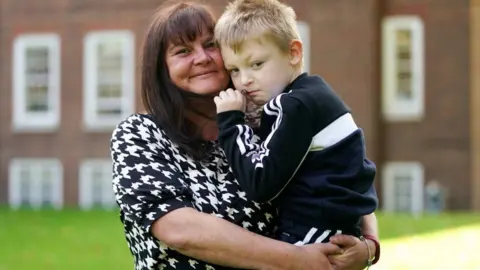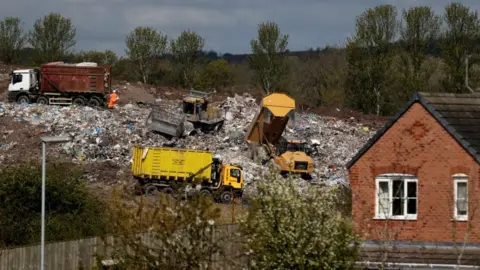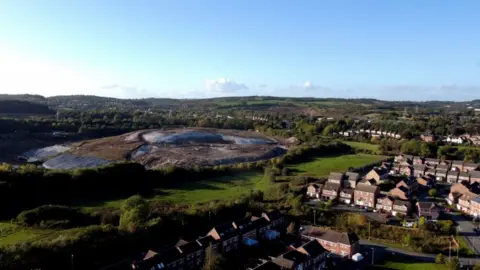Walleys Quarry: Mum seeks Supreme Court ruling on landfill gas
 PA Media
PA MediaLawyers for a Staffordshire boy who claim his life is being shortened by noxious landfill site gas say they will take his case to the Supreme Court.
In September, a High Court judge ordered the Environment Agency (EA) to enforce more reductions in hydrogen sulphide levels at Walleys Quarry.
But the Court of Appeal overturned this ruling after a challenge by the EA.
Mathew Richards' mother Rebecca Currie said: "I hope that the Supreme Court will take a different view."
The judge at the High Court went "beyond the role of the court", two Court of Appeal judges decided.
They gave their decision in December but revealed the reasons for it on Monday.
Five-year-old Mathew, who lives near Walleys Quarry, was born prematurely with a chronic lung disease.
His mother said she felt "upset, confused and angry" at the Court of Appeal's judgement.
 Reuters
ReutersThe family's solicitor Rebekah Carrier called it a "very disappointing judgement" and said they would take the case to the UK's highest court "as a matter of the utmost urgency".
A spokesperson for the EA said it remained determined to tackle the issues at the quarry and would continue to work with the operator and other groups to bring hydrogen sulphide (H2S) emissions under control.
The site's operator, Walleys Quarry Ltd, said: "We continue fully to support the defence successfully brought by the Environment Agency in what we believe was a misplaced legal action brought by the family."
Lawyers for Mathew successfully argued in August at the High Court the gases from the landfill site had worsened his underlying health issues and H2S emissions were affecting hundreds and probably thousands of local people.
The court heard about 45,000 complaints had been lodged about Walleys Quarry, near Silverdale, over several months in 2021.
In September, Mr Justice Fordham ruled the gases were having a direct effect on the child, said he was not satisfied the EA had complied with its legal duties and ordered them to ensure H2S levels were cut to a safe level by January 2022.
 Reuters
ReutersBut the agency appealed successfully after arguing the judge overstepped the mark in giving it a timeframe it had to follow and said it had brought emissions down.
In their written judgement, the Court of Appeal judges agreed and said the agency had not acted unlawfully in the work it had already carried out to cut H2S levels.

Follow BBC West Midlands on Facebook, Twitter and Instagram. Send your story ideas to: newsonline.westmidlands@bbc.co.uk
